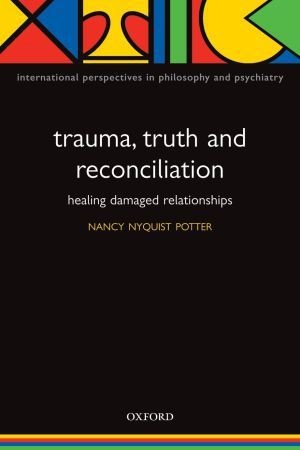Read more
Zusatztext This is a book about a singularly important topic: how do we repair relationships after a wrong, often a wrong so severe that it cannot be simply rectified? How, after either personal or communal abuse or trauma, do we avoid the vortex of recrimination and retaliation? It is a book that deserves to be read slowly and taken seriously... an important book [that] should interest students and scholars of many disciplines. Most of all it should interest those concerned for the human condition. Informationen zum Autor Nancy Nyquist Potter received her Ph.D. in Philosophy in 1994 from the University of Minnesota and she is currently an Associate Professor of Philosophy at the University of Louisville. Her research interests range from virtue ethics to the role of humor in conflict to philosophy and mental illness. She is Vice-President of the Association for the Advancement of Philosophy and Psychiatry, an Associate Editor for the journal Philosophy, Psychiatry, and Psychology, and serves on local hospital ethics committees and councils. Klappentext People do great wrongs to each other all the time! sometimes deliberately! sometimes accidentally. This book looks at how people! communities! and nations can address great wrongs and how they can heal from them - taking into consideration how differences in cultures! histories! and group expectations affect the possibilities for healing. Zusammenfassung People do great wrongs to each other all the time, sometimes deliberately, sometimes accidentally. This book looks at how people, communities, and nations can address great wrongs and how they can heal from them - taking into consideration how differences in cultures, histories, and group expectations affect the possibilities for healing. Inhaltsverzeichnis 1: David H Brendel: Psychotherapy and the truth and reconcilation commission: the dialectic of individual and collective healing 2: Christa Kruger: Spiral of growth: a social psychiatric perspective on conflict resolution, reconciliation and relationship development 3: Peter Zachar: Reconciliation as compromise and the management of rage 4: Colleen Murphy: Political reconciliation, the rule of law and post-traumatic stress disorder 5: Allison Mitchell: When philosophical assumptions matter 6: Deborah Spitz: How much truth and how much reconciliation? Intrapsychic, interpersonal and social aspects of resolution 7: Mary Rawlinson: Forgiveness: Beyond virtue and the law; on the moral significance of the act of forgiveness in Hegel's Phenomenology of Spirit 8: Gerrit Glas: Elements of a phenomenology of evil and forgiveness 9: Piet Verhagen: Forgiveness: a critical appraisal 10: Sharon Lamb: Forgiveness therapy in gendered contexts: what happens to the truth? 11: Christian Perring: Telling the truth about mental illness: the role of narrative 12: Lewis Mehl-Madrona: Healing relational trauma through relational means: aboriginal approaches ...

